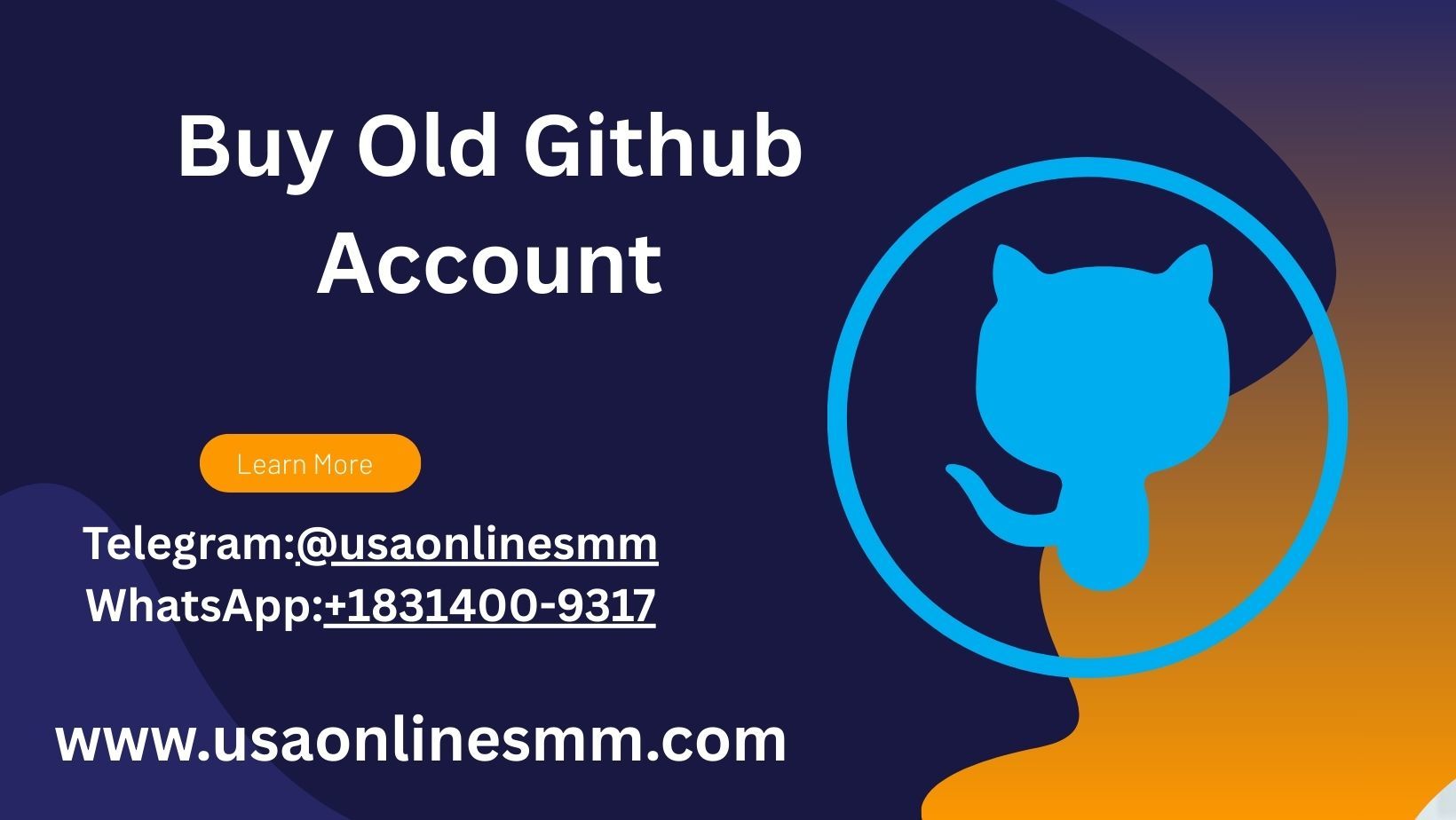Buy Old Github Account
GitHub has transformed the way developers collaborate, share code, and contribute to open-source projects. For many tech enthusiasts, startups, and companies, having an established GitHub account can accelerate credibility, visibility, and access to valuable resources. While creating a new GitHub account is straightforward, buying an old GitHub account offers significant advantages that can help individuals and businesses gain a head start in the competitive world of software development.
If you want to more information just knock us 24-hour reply
**
Telegram*[:@usaonlinesmm](url[](url*))
WhatsApp*[:+1831400-9317](url)*
Advantages of Buying an Old Github Account
An old GitHub account comes with several intrinsic benefits that new accounts simply cannot offer. First, an aged account often has higher trust signals associated with it. Search engines and communities tend to recognize older accounts as more reliable, increasing the likelihood of collaboration, visibility, and engagement.
Additionally, older accounts may already have repositories with meaningful content. This provides a foundation that new users can leverage for their projects, demonstrating expertise and attracting contributions. Access to an existing network of followers and starred repositories can also expand opportunities for collaboration and professional growth.
How an Old Github Account Boosts Online Presence
The digital world often values history and credibility. When a GitHub account has existed for several years, it carries an implicit reputation that can be difficult to establish from scratch. Tech recruiters, potential clients, and collaborators frequently examine account age as an indicator of consistency and commitment. A seasoned GitHub account signals stability and reliability in open-source contributions, which can be a deciding factor for partnerships or hiring decisions.
Moreover, older accounts are often indexed better by search engines. This means that repositories, projects, and contributions from an aged account are more likely to appear in search results, increasing organic visibility for the projects associated with the account.
Choosing the Right Old Github Account
Selecting the ideal GitHub account to purchase requires careful consideration. Not all old accounts offer the same benefits, and choosing an account that aligns with your goals is crucial. The first step is to evaluate the account’s repository history. Look for meaningful contributions, active projects, and consistent activity patterns. These factors indicate that the account has been used authentically and carries credibility.
Next, examine the account’s followers and network. An account with a substantial number of followers can provide immediate visibility for your projects, while active engagement with other users ensures that your contributions are noticed within the developer community.
Evaluating Reputation and Trustworthiness
When buying an old GitHub account, verifying its authenticity is essential. Accounts with suspicious activity, spammy repositories, or unverifiable histories can damage your credibility. Check the account’s contribution graph, repository quality, and interactions with other developers to ensure it has a trustworthy background.
It is also important to communicate with the account seller to understand the account’s history. Transparency about ownership, previous activity, and compliance with GitHub’s terms of service can prevent future issues, including potential suspensions or restrictions.
Legal and Ethical Considerations
Buying and selling GitHub accounts is a sensitive subject, and ethical considerations must be prioritized. While acquiring an old account can be advantageous, it is important to ensure that all transactions comply with GitHub’s policies. Unauthorized transfers or misuse of accounts can result in permanent bans, so it is crucial to perform due diligence and ensure proper account handover procedures are followed.
Additionally, consider the ethical implications of using an account that was previously associated with another developer. Maintaining transparency in your project contributions and acknowledging any inherited work can build trust within the developer community.
Steps to Acquire an Old Github Account Safely
Acquiring an old GitHub account requires a structured approach. Start by identifying reputable sellers or platforms that specialize in account transfers. Verify the seller’s credibility by checking reviews, previous transactions, and account details.
Once a suitable account is identified, negotiate the transfer process carefully. Ensure that all login credentials, recovery emails, and two-factor authentication settings are updated to secure the account. Changing passwords, updating profile information, and reviewing repository licenses are critical steps to fully integrate the account under your ownership.
Leveraging an Old Github Account for Career Growth
An old GitHub account can be a valuable asset for personal and professional development. By utilizing pre-existing repositories and contributing to ongoing projects, you can quickly showcase skills, attract potential employers, and gain recognition in the developer community.
Many recruiters and tech companies evaluate GitHub profiles as part of the hiring process. An account with a solid history of contributions, high-quality repositories, and meaningful engagement can significantly improve your chances of landing opportunities and building a professional portfolio.
Using Old Github Accounts for Business Advantage
Startups and companies can also benefit from acquiring old GitHub accounts. An established account can serve as a foundation for open-source projects, corporate contributions, or product showcases. Older accounts often come with historical credibility, making it easier to gain trust from clients, partners, and the open-source community.
Additionally, businesses can leverage the account’s network to expand reach, promote projects, and attract skilled developers. By integrating an old account into corporate development strategies, companies can accelerate project visibility and establish a strong online presence in the technology sector.
Common Mistakes to Avoid
When buying an old GitHub account, there are several pitfalls to be aware of. First, avoid accounts with incomplete or low-quality repositories, as they may not offer meaningful value. Next, do not overlook account history verification, since accounts with suspicious activity can lead to penalties or reputational damage.
Another common mistake is neglecting to update security settings. Failing to change passwords, recovery emails, and authentication methods can leave the account vulnerable to unauthorized access or hacking attempts. Finally, ensure compliance with GitHub’s policies to avoid violations that could result in account suspension.
Maintaining an Old Github Account
Once you acquire an old GitHub account, maintaining it responsibly is essential. Regularly update repositories, engage with the developer community, and document contributions to preserve the account’s credibility. Maintaining activity demonstrates commitment and professionalism, enhancing the account’s reputation further.
It is also advisable to review repository licenses, remove outdated projects, and optimize profiles for search engine visibility. These practices ensure that the account remains valuable for future projects, collaborations, and career advancement.
Conclusion on Buying Old Github Account
Buying an old GitHub account can offer a competitive advantage for developers, startups, and companies seeking to enhance their online presence. By providing established credibility, pre-existing repositories, and an engaged network, older accounts accelerate growth and open new opportunities.
However, this process requires careful evaluation, ethical considerations, and proper maintenance to ensure that the account provides long-term value. When chosen and managed wisely, an old GitHub account can be a powerful asset in the world of software development, helping individuals and businesses achieve their goals faster and more efficiently.






Discussion (0)